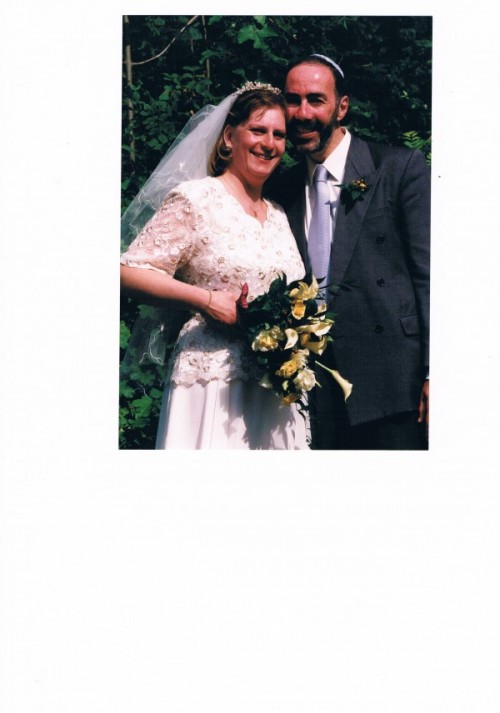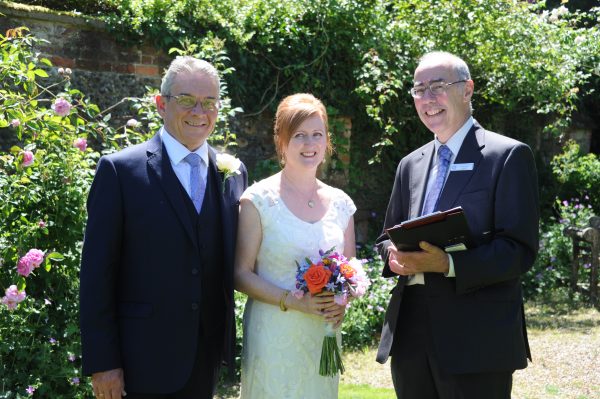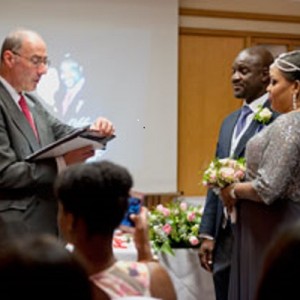
by Michael | Sep 11, 2018 | Blog
Divorce isn’t the only reason why a marriage breaks up . It could be due to death. And it’s reasonable that people can find it difficult to gee themselves up for remarriage.
Certainly, many people who marry again go for a smaller affair than the original.
One big ‘plus’
A huge advantage about a second wedding is that it can be much more fun than the first!
Think about it. This time there won’t be the stress of family pressure. You can make your own decisions freely. This marriage is exclusively about the two of you. You are mature, consenting adults – maybe with your own children and homes. Your ceremony is all about your commitment to each other (although sharing the celebrations with others is very much a part of it too).
The good news is, then, that you don’t have to follow other people’s rules. You can do what you want for remarriage.
That means that clothing, guests, venue, celebrant, reception are all up to you.
Clothing
There is no obligation to wear – or avoid – any particular clothing. If a second-time bride wants to wear white, why shouldn’t she? (Even if she wore it the first time around.) A full-length gown is lovely, but why not a shorter dress in a different colour or colours? Formal or informal? It’s down to you.
Guests
First time around, you had to make compromises as to who you invited. Now you can have a huge affair or fly off somewhere with just a couple of friends. You might have a small reception for closest family and friends. There is no need to break the bank, if you do not want to.

Ceremony
If you want a creative, personalised ceremony, then have a chat to a Civil Celebrant. You will get good ideas and will be able to put together a ceremony that reflects your personality and will be really special.
Look at the information at https://vowsthatwow.co.uk/civil-weddings/.
Venue
Depending on your religion’s take on remarriage, the religious option may be for you; alternatively, you may want only a quiet (if uninspiring) register office wedding.
Many people these days choose a hotel or restaurant, but there’s nothing to stop you using a back garden, museum, hot-air balloon or wherever your imagination takes you. (Remember to get permission first!) Your celebrant can explain how it all works.
It can be a casual affair or as formal as you choose. But of course, whatever your options, your wedding will still need to be legally registereed.
Reception
Again, the scale and budget of the affair will dictate what sort of reception you will choose. You might like to read my comments on receptions in a past blog: http://wp.me/p5qOOT-w7 .
Wedding gifts
You may organise a wedding list, but you may – especially if you are combining two homes – already have virtually everything you need. There’s nothing to stop you inviting guests to contribute money to a charity of your choice.
I hope these suggestions will be useful to you – however many marriages you have already experienced! You will learn from any past mistakes and enjoy precisely the wedding that you desire.
Don’t forget to ask your celebrant for help or advice.
by Michael | Jul 5, 2016 | Blog
It’s not unusual for couples to be entering a second marriage. As a celebrant, I delight in seeing more mature people so obviously in love and glowing with joy.
Being that bit older can often mean that the couple has freedom to choose how they want to mark their big occasion. They may be of independent means – and, of course, their parents may not have the influence on decisions that they once had – indeed, they may not even be around any more. So the couple can do it “their way”, and that’s brilliant!
However, a more challenging aspect may be how (or if) to involve any children that may be on the scene.
The children’s ages will be a deciding factor, as will personality, and personal choices.
If you want to involve them actively, I’d suggest any (or all) of the following – aimed primarily, but not exclusively, at teenage children:
- Involve them in the planning
Your children will probably appreciate being consulted and involved, particularly when it comes to the reception. They may have surprisingly good ideas about a children’s table, their menus, entertainment and music.
They might even emerge onto the dance floor at the reception, if a few of their favourite songs have been included.
- Involve them practically
More artistic children may be able to create décor either for the ceremony or for the reception (serviette folding, name cards, banners, etc.).
Musical ones – very musical children – may be able to sing or play something either at the ceremony or at the reception. (Just beware of being too self-indulgent : inviting little Johnny, who’s only had four hours’ lessons, to play Sibelius’s violin concerto is asking for a lot of restlessness among the guests [beyond the initial “aaah, bless”].)
Some may be able to read a text of some sort (although they may need instruction on reading in public).
Children may be part of the procession/recession, although again instruction from, say, the celebrant may be wise.
Do give each of the children a role, and, unless it is unavoidable, don’t leave anyone out.
- Invitations
If it fits in with your budget, maybe you can let your child invite a best friend. That way, they won’t feel isolated in an adult world, but can enjoy empathetic company.
- The Ceremony
Apart from processing, a child can be an usher (possibly, with a specific role, such as directing people to their places, or collecting and guarding the presents). A child can give away the mother, or can be the ring-bearer (but choose that child with care!).
Children can also be part of a ritual.
- Unity Rituals
Among possible rituals, one example is the Unity Candle ritual. Each child is provided with a taper and (health and safety permitting!) they all use these to light the Unity Candle together with the bride and groom. The symbolism is strong and affecting.
An alternative is for them to make vows to their new step-parents (who could reciprocate).
- Make the children feel special
Again, age will be a determinant, but an older child could propose a toast at the reception.
Dancing with the step-parents can be a lovely touch (but arrange this with both parties well in advance!).
Children can be a boon or a challenge at such an event. Make a positive out of their presence!
As the children (like it or not!) are joining a new family, it makes a lot of sense to include them wherever possible. If you start bonding with them in early days, that has got to make sense, hasn’t it?
by Michael | Jan 7, 2016 | Blog
Mature marriage is in no way rare these days, even if most people still tend to think of a wedding as a “young person’s thing”.
Why marry when older?
In many cases, people are choosing to put off their wedding longer so that they can enjoy themselves before being encumbered by a family. They may want to establish a business or career, and need to devote their time to this.
Some people believe they shouldn’t marry until they are ‘sure’ that the relationship has a good chance of lasting. They may lack confidence.
Older people are returning to the marriage market for another go. They may be divorcees or widows/widowers.
Gay couples in a civil partnership are increasingly looking to convert their legal status to marriage, and many established pairs are therefore taking advantage.
Should the ceremony be different?
A church wedding (if permitted) and, indeed, a register office ceremony, will be the same for an 18-year-old or for a 58-year-old. They are basically standard ceremonies.
If you’re looking for a bespoke ceremony, you will need a civil ceremony.
Civil Ceremony suggestions
By the nature of the thing, no two civil ceremonies are likely to be the same, so it is impossible to be prescriptive.
Nevertheless, when approached by more mature couples, I still have the preliminary chat and establish what elements (if any) they have in mind. I make suggestions and then, over time, send them drafts for them to approve.
The areas I am likely to cover include music, rituals and readings.
- There is no reason why older couples can’t enjoy the same sort of music as youngsters (if that’s their choice). They may choose the same rituals (a Unity Candle is always lovely – but older pairs may have families they want to involve, so this ritual can be expanded to include offspring etc.). Either age group may decide to include the offering of a gift, such as a red rose, to their parents during the marriage.
A good celebrant ought be able to supply suitable suggestions.
Of course, some rituals (such as ‘jumping the broom’) may be less advisable for more mature couples!
- There’s no reason why age should prevent couples from writing and/or reciting their vows or having the rings blessed.
- Readings can be whatever the couple want, and many are not age-specific in any way. However, some are suitable for more mature couples. I like this anonymous passage (for very mature couples!), and I conclude with it:
“The question is asked: ‘Is there anything more beautiful in life than a young couple clasping hands and pure hearts in the path of marriage? Can there be anything more beautiful than young love?’ And the answer is given: ‘Yes, there is a more beautiful thing. It is the spectacle of an old man and an old woman finishing their journey together on that path. Their hands are gnarled but still clasped; their faces are seamed but still radiant; their hearts are physically bowed and tired but still strong with love and devotion. Yes, there is a more beautiful thing than young love. Old love.’
by Michael | Jan 4, 2016 | Blog
Remarriage usually has its issues. A potential complication can arise when either, or both of them, has children.
How should these be involved in the ceremony?
Of course, this is a matter of choice. The children may prefer to stay on the periphery – or you may decide that they should keep a low profile. A lot will depend on their ages.
Here are some suggestions that might work well, particularly with teenage children.
- Planning
Your children could contribute towards the choice of music at the reception. You might be surprised at what they actually ask for – and it will be special if they are out on the dance floor (voluntarily) from time to time.
If they are artistic, children may be able to help create the ceremony décor; very musical ones might be able to sing a bit at the service, accompany the music on guitar etc. (if up to it!) or simply do a reading.
Children might be allowed input into the choice of menu at the reception – especially if they are getting a different meal.
Do give each of the children a role, and, unless it is unavoidable, don’t leave anyone out.
- Invitations
If you can afford it, why not let your friend/daughter invite a friend (each)? Even the moodiest of teenagers will appreciate the gesture, and your kind thought may spare him/her from what can be a fairly isolating experience.
- The Ceremony
There are plenty of ways to involve the children in the ceremony itself. Traditionally, they can be asked to be ushers (groomsmen) or bridesmaids. But younger boys could do the Best Man bit with the rings (although I understand it if some might consider that a risky move!). They could always be the ones who give Mum away at the start of proceedings.
- Unity Rituals
A lovely idea is to ask the children to participate in a ceremony ritual. They could make vows to their new step-parents (who could reciprocate). They could be part of a sand-blending ceremony, but my favourite as a civil celebrant is the Unity Candle.
Provide each child with a taper and (health and safety permitting!) they and the couple all use the tapers to light the Unity Candle at the same time. The symbolism is strong and affecting.
- Make the children feel special
After the ceremony, children could help usher guests through to the reception. Then, with age of course a determinant, an older child could propose a toast at the reception.
They might be given flowers to present to their mothers or new step-mothers at the time of the speeches.
Depending on the child’s maturity, he/she could be allowed a very short speech.
Dancing with the step-parents can be lovely (although it may be as well to warn the step-child well in advance!).
As the children (like it or not!) are joining a new family, it makes a lot of sense to include them wherever possible on, and maybe before, the big day. If you can start bonding with them in early days, that has got to be for the best.

by Michael | Aug 25, 2015 | Blog
There is no reason why life-cycle ceremonies should be confined to the young. Those who are young at heart (or who actually admit to being “more mature”) can enjoy the benefits too.
Weddings
Why marry at a later age?
- To ‘live a bit’ before having a family
- to establish a career first
- to be sure the relationship will work
- to have another go (remarriage after divorce or death)
- as a gay couple, to convert their legal status
Should it be different from a younger couple’s wedding?
In practice, a wedding (civil or religious) can be the same for any couple (but please note that I would not expect any two civil weddings I conduct to be identical!).
Age may dictate a few differences – some more subtle than others:
- the mature couple may prefer a smaller ceremony, especially if they have already experienced a big first wedding
- the mature couple may now have their own families, and want to involve them
- they may prefer more age-specific readings
- a mature wedding may be more fun! There’s less likely to be family pressure, so they can choose what they want to include and whom to involve – they can dictate ceremony tone and content, clothing, celebrant, venue and guests
- a mature couple may not want wedding presents – instead, people can be given the opportunity to contribute to a charity of the couple’s choosing
- a ritual like “jumping the broom” may not be advisable for less sprightly people!

Vow Renewals
For a full discussion about Vow Renewals (why have one and how to mark it), please click on this blog link.
Vow Renewals have deservedly been gaining in popularity. Like weddings (see above), the couple nowadays has tremendous freedom of choice. Their event can reflect their personality, beliefs and wishes, so is often unforgettably unique. Of course, a good civil celebrant’s suggestions and advice will be invaluable in putting this together.
So a more mature couple should not feel deterred by age or even infirmity. The choices are out there – a small or large ceremony, religious, non- or part-religious, in a back garden, hot air balloon, dining room, castle etc., formal or less so, intimate or large-scale. The important thing is for the couple to choose what they are happy with so that they can enjoy a memorable and meaningful special day.
Then they can show those young whippersnappers a thing or two!



